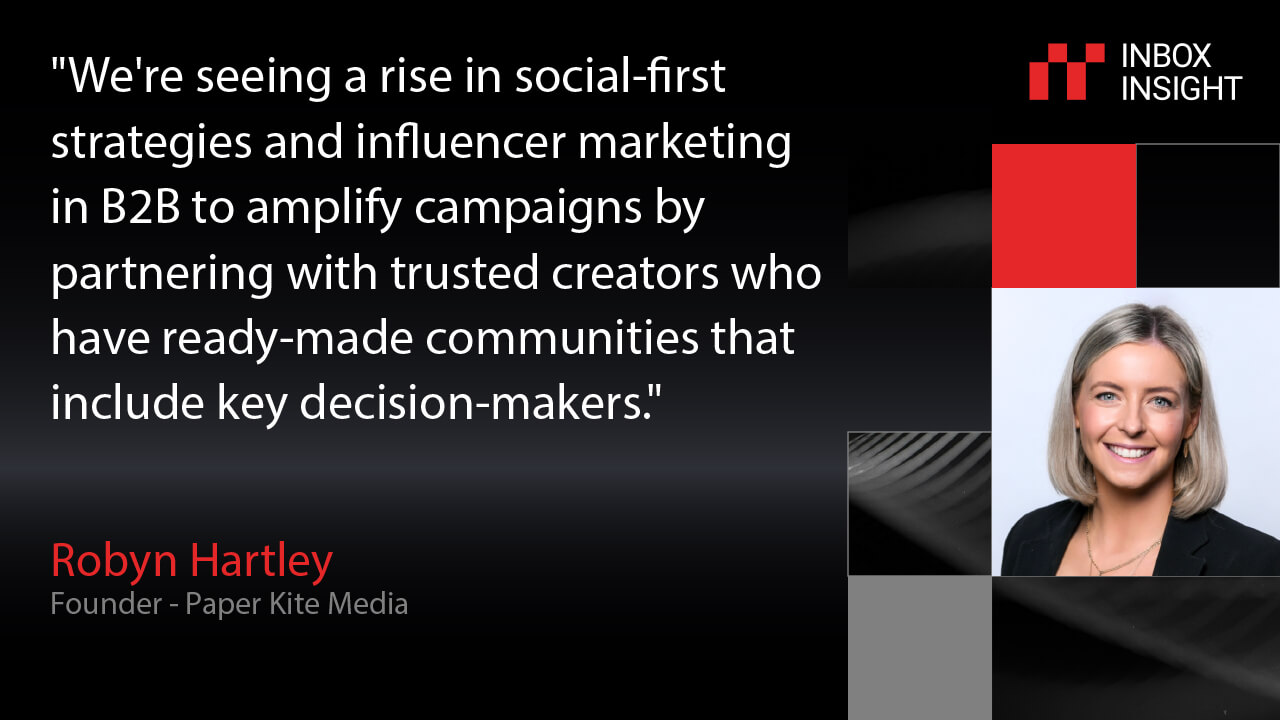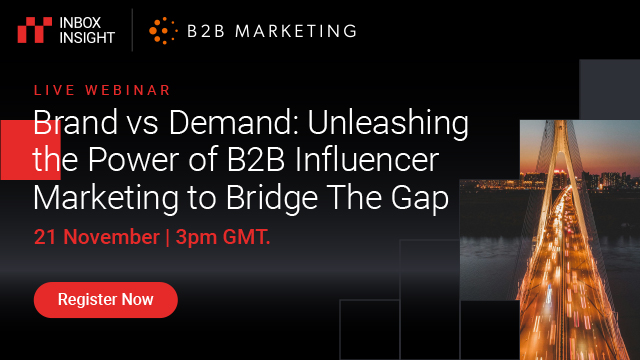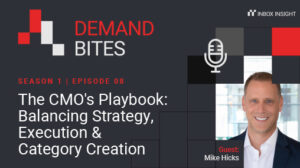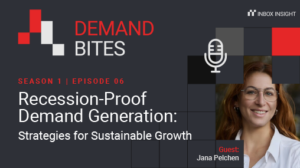B2B brands face a growing challenge: building trust and aligning brand awareness with demand generation in an increasingly competitive marketplace. As standing out and connecting with potential buyers becomes more complex, one solution has proven especially effective—B2B influencer marketing.
Over the past five years, influencer marketing has transformed how B2B companies engage with their target audiences, offering a fresh take on traditional strategies and bridging the gap between brand recognition and demand generation.
This article explores how influencer marketing enhances B2B brand trust and drives demand. We’ll define its role in B2B marketing, highlight key benefits, and outline strategies to transform brand awareness into tangible results.
Understanding B2B influencer marketing
B2B influencer marketing involves collaborating with industry experts, thought leaders, and professionals who have a significant following and influence within specific business sectors. Unlike its B2C counterpart, which often focuses on celebrities or social media personalities, B2B influencer marketing targets individuals with deep industry knowledge and credibility.
The relevance of influencer marketing in the B2B space has grown significantly in recent years. As traditional marketing methods become less effective, businesses are turning to influencers to help them connect with their target audience in a more authentic and meaningful way.
The shift towards influencer engagement
The shift towards influencer engagement in B2B marketing is driven by changing buyer behaviors and the need for more trustworthy sources of information. Increasingly, B2B buyers are turning to trusted sources for information, and often, these trusted sources are influencers.
According to Inbox Insight research, 75% of decision-makers trust a brand more if it is affiliated with industry experts or influencers, highlighting the significant role of industry expertise and influencer credibility in building trust with B2B decision-makers.
The importance of social networks as part of the marketing mix has increased significantly in recent years. B2B companies are recognizing the power of social media platforms in reaching and engaging their target audience.

Influencers play a crucial role in this landscape, as they can leverage these platforms to create meaningful discussions, share knowledge, and establish a strong digital presence for the brands they collaborate with.
The advantages of B2B influencer marketing
1. High-quality content creation
One of the primary advantages of B2B influencer marketing is the creation of high-quality, authentic content. Influencers bring their expertise and unique perspectives to the table, resulting in content that resonates with the target audience. Understanding why content marketing is essential for engaging audiences and building trust in B2B marketing helps highlight the importance of using strategic, relevant content as the foundation of these efforts.
Authenticity is crucial in B2B marketing, where decisions often involve significant investments and long-term commitments. Influencers can provide genuine insights and experiences that add value to the content they create. This authenticity helps build trust with potential buyers, making them more receptive to the brand’s message.
Examples of content types that B2B influencers can create include:
- In-depth blog posts discussing industry trends and challenges
- Informative videos showcasing product demonstrations or case studies
- Webinars featuring expert panels and Q&A sessions
- Podcasts exploring industry-specific topics
- Whitepapers and eBooks offering detailed insights and solutions
2. Fostering organic engagement
B2B influencers excel at building trust with their audience through consistent, valuable content and interactions. This trust translates into higher engagement rates for the brands they collaborate with.
Influencers leverage these platforms to foster meaningful discussions, share knowledge, and establish a strong digital presence. When an influencer shares content related to a B2B brand, their audience is more likely to engage with it, ask questions, and share it with their own networks. This organic engagement can lead to increased brand visibility and credibility within the industry.
3. Boosting demand generation
Influencers play a crucial role in communicating a brand’s value proposition to potential buyers. By sharing their experiences and insights, influencers can help their audience understand how a product or service can solve specific business challenges.
Influencer campaigns outperform traditional marketing by producing three times as many leads and have an average campaign conversion rate of around 13%. These statistics demonstrate the significant impact that influencer marketing can have on demand generation for B2B brands. For businesses aiming to maximize these results, using advanced tactics for efficient growth in demand generation can further enhance strategic planning and streamline campaign effectiveness.
To measure the success of influencer marketing in boosting demand generation, B2B companies can track metrics such as:
- Lead generation: The number of new leads attributed to influencer campaigns
- Sales pipeline growth: The increase in potential deals influenced by influencer content
- Conversion rates: The percentage of leads that turn into customers
- Website traffic: The increase in visitors from influencer-driven sources
- Engagement rates: The level of interaction with influencer-created content
Strategies to convert brand recognition into tangible demand
Identifying the right influencers
Selecting the right influencers is crucial for the success of any B2B influencer marketing campaign. When identifying potential influencers, consider the following factors:
- Audience fit: Ensure the influencer’s audience aligns with your target market
- Industry relevance: Look for influencers with expertise in your specific industry or niche
- Engagement rates: Analyze the influencer’s ability to generate meaningful interactions with their audience
- Content quality: Assess the depth and value of the content they produce
- Values alignment: Choose influencers whose values and messaging align with your brand
By analyzing patterns, understanding audience behavior, and identifying trends, data-driven strategies guide influencer collaborations. Utilize data analytics tools to help identify influencers who are most likely to drive results for your brand.
Creating compelling campaigns
To maximize the impact of your B2B influencer marketing efforts, focus on creating compelling campaigns that resonate with your target audience. Some effective types of campaigns include:
- Webinars: Host virtual events featuring influencers as speakers or panelists
- Social media promotions: Collaborate on social media content that showcases your brand’s value
- Content collaborations: Co-create whitepapers, e-books, or blog posts with influencers
- Product reviews: Invite influencers to review and share their experiences with your products or services
- Case studies: Work with influencers to develop in-depth case studies highlighting your solutions
When developing these campaigns, maintain consistency in messaging across all touchpoints. Ensure that the influencer’s content aligns with your brand voice and values while allowing room for their unique perspective.
One of the challenges of connecting influencer marketing programs in B2B to tangible demand generation results is to prove the relevance of who you are engaging. By adding an expert voice to your campaign, but combining it with targeted paid advertising and content syndication, you can ensure their message reaches the right audience in your ICP.
Ross Howard, Product Marketing Director
Leveraging data and analytics
In an era where data guides decisions, influencer marketing is no exception. To maximize the effectiveness of your B2B influencer marketing efforts, it’s essential to leverage data and analytics throughout the process.
Use tools and platforms specifically designed for tracking influencer campaign performance. These may include:
- Social media analytics tools to measure engagement and reach
- Influencer marketing platforms that offer campaign management and tracking features
- Customer relationship management (CRM) systems to monitor lead generation and conversion
- Web analytics tools to track traffic and user behavior from influencer-driven sources
Regularly analyze the data collected from these tools to gain insights into what’s working and what needs improvement. Use these insights to continuously refine your influencer marketing strategy, adjusting your approach based on performance metrics and audience feedback.
Conclusion
B2B influencer marketing is a powerful strategy to build brand trust and drive demand. By partnering with industry influencers, B2B companies can create authentic connections, produce quality content, and foster meaningful engagement. This approach bridges the gap between awareness and demand, leading to greater lead generation and brand recognition. With 59% of B2B marketers planning to boost influencer budgets next year, now is the time to consider influencer marketing for growth and competitive advantage.
Join our webinar to learn actionable strategies, hear expert insights, and see real-world success stories.







